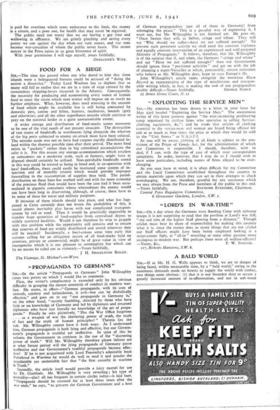FOOD FOR A SIEGE
SIR,—The time has passed when any who dared to hint that these islands were a beleaguered fortress could be accused of " doing the nation a disservice." Today Lord Woolton has to deplore that so many still fail to realise that we are in a state of siege created by the tremendous shipping-losses incurred in the Atlantic. Consequently, the necessity for producing and economising every ounce of human food to meet the strain which next winter will impose on us needs no further emphasis. What, however, does need stressing is the amount of food which might be available but is still being consumed by domestic pets, canine and feline, hunters, racehorses, hounds (grey and otherwise), and all the other superfluous mouths which continue to prey on the national larder to a quite unwarrantable extent.
A wider storage and distribution of food-stocks seems moreover to be one of the vital needs of our present situation. The destruction of vast stores of foodstuffs in warehouses lying alongside the wharves of the big ports subjected to enemy air-attack must have been colossal. The mistake made was not to have had cargoes rapidly distributed in- land within the shortest possible time after their arrival. The more food exists in " packets " rather than in big centralised accumulations the safer it is. For this reason any storage-accommodation which retailers or consumers on a moderate scale, such as farmers, might have at disposal should certainly be utilised. Non-perishable foodstuffs stored in this way could be treated as being in bond and, in co-operation with local food-offices, there could easily be instituted some system of in- spection and of monthly returns which would prevent improper forestalling in the consumption of supplies thus held. The petrol- distribution on these lines has worked well and with far more economy of the precious fluid than would have been the case had it been accu- mulated in gigantic containers whose whereabouts the enemy would not have been long in discovering, although, of course, there have to be some of these for naval and military purposes.
If invasion of these islands should take place, and what has hap- pened in Crete certainly does not lessen the probability of this, it would almost inevitably play havoc with our complicated transport- system by rail or road. Then it would be practically impossible to transfer huge quantities of food-supplies from centralised depots to widely scattered localities. Would it not therefore be wise to grapple with this problem while the opportunity still remains and to ensure that reserves of food are widely distributed and stored wherever they will be needed? Incidentally, a food-census some time early this autumn calling for an obligatory return of all food-stocks held on premises, private or commercial, might be of great value in view of emergencies which it is not pleasant to contemplate but which can by no means be ruled out as visionary.—Yours faithfully,


























 Previous page
Previous page